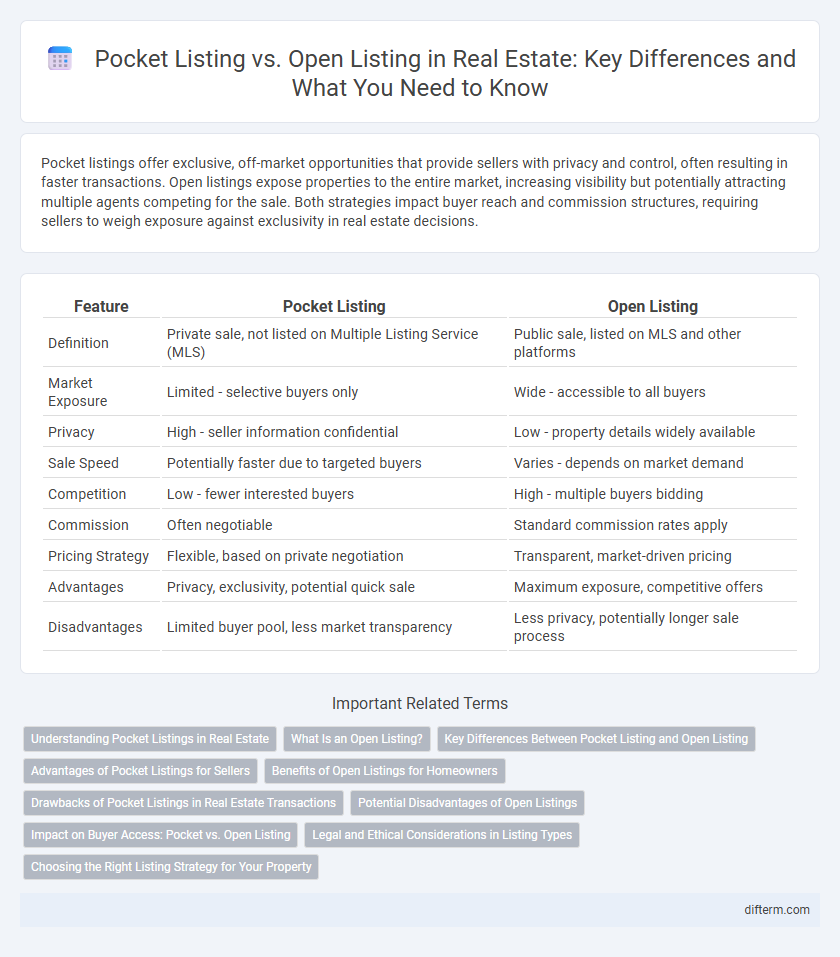Pocket listings offer exclusive, off-market opportunities that provide sellers with privacy and control, often resulting in faster transactions. Open listings expose properties to the entire market, increasing visibility but potentially attracting multiple agents competing for the sale. Both strategies impact buyer reach and commission structures, requiring sellers to weigh exposure against exclusivity in real estate decisions.
Table of Comparison
| Feature | Pocket Listing | Open Listing |
|---|---|---|
| Definition | Private sale, not listed on Multiple Listing Service (MLS) | Public sale, listed on MLS and other platforms |
| Market Exposure | Limited - selective buyers only | Wide - accessible to all buyers |
| Privacy | High - seller information confidential | Low - property details widely available |
| Sale Speed | Potentially faster due to targeted buyers | Varies - depends on market demand |
| Competition | Low - fewer interested buyers | High - multiple buyers bidding |
| Commission | Often negotiable | Standard commission rates apply |
| Pricing Strategy | Flexible, based on private negotiation | Transparent, market-driven pricing |
| Advantages | Privacy, exclusivity, potential quick sale | Maximum exposure, competitive offers |
| Disadvantages | Limited buyer pool, less market transparency | Less privacy, potentially longer sale process |
Understanding Pocket Listings in Real Estate
Pocket listings in real estate refer to properties marketed privately by agents without being publicly listed on the Multiple Listing Service (MLS), allowing exclusive access to select buyers and preserving seller confidentiality. These listings often create limited market exposure but can generate quicker sales through established agent networks and off-market relationships. Understanding pocket listings helps sellers weigh the trade-off between privacy and maximum market reach compared to open listings, which are publicly available to all agents and buyers.
What Is an Open Listing?
An open listing is a non-exclusive real estate agreement where multiple brokers have the right to sell a property, but only the broker who secures the buyer earns a commission. This type of listing offers maximum exposure but lacks the commitment and marketing efforts typical of exclusive listings. Open listings are commonly used for properties where sellers prioritize flexibility and minimal control over the selling process.
Key Differences Between Pocket Listing and Open Listing
Pocket listings are exclusive property sales marketed privately to a limited network, maintaining confidentiality and often attracting high-end buyers, while open listings are publicly advertised on Multiple Listing Services (MLS) to reach a broader audience. Pocket listings provide sellers with discretion and potentially less competition but may result in fewer offers, whereas open listings maximize exposure and generate competitive bidding through widespread visibility. Agents handling pocket listings typically work on a sole or exclusive agency basis, contrasting with open listings where multiple agents can represent the property, influencing commission structures and marketing strategies.
Advantages of Pocket Listings for Sellers
Pocket listings offer sellers enhanced privacy and control by limiting property exposure to a select network of qualified buyers, reducing market saturation and competitive pressure. These listings allow for a tailored marketing strategy that can preserve the home's exclusivity while potentially securing higher offers from motivated buyers. Sellers often benefit from faster transactions and reduced commission fees, as fewer intermediaries are involved compared to open listing scenarios.
Benefits of Open Listings for Homeowners
Open listings offer homeowners maximum exposure by allowing multiple agents to market the property, increasing the likelihood of a faster sale. Homeowners retain flexibility in choosing the buyer and negotiating terms without exclusivity constraints. This approach often leads to competitive offers, potentially driving up the sale price and enhancing overall market visibility.
Drawbacks of Pocket Listings in Real Estate Transactions
Pocket listings limit property exposure by restricting marketing to a select group of agents, reducing competitive offers and potentially lowering the final sale price. These listings can decrease transparency, leading to conflicts of interest and less equitable market conditions for buyers and sellers. Limited exposure also prolongs time on market, as fewer prospective buyers learn about the property compared to open listings.
Potential Disadvantages of Open Listings
Open listings can lead to reduced seller control since multiple agents may list the same property, causing confusion and competition that may lower the final sale price. Exposure can be limited because agents lack exclusive marketing incentives, resulting in less aggressive promotion compared to exclusive or pocket listings. Furthermore, the seller might face challenges tracking offers and negotiations, increasing the risk of missed opportunities or inconsistent communication.
Impact on Buyer Access: Pocket vs. Open Listing
Pocket listings limit buyer access by restricting property visibility to select agents or clients, reducing market exposure and potentially slowing the sale process. Open listings maximize buyer access by publicly marketing the property through multiple platforms and agents, increasing competition and chances for quicker sales. The choice between pocket and open listings significantly impacts the pool of interested buyers and overall market reach.
Legal and Ethical Considerations in Listing Types
Pocket listings raise significant legal and ethical considerations due to their limited market exposure, which can conflict with fiduciary duties to provide fair and transparent opportunities for all potential buyers. Open listings promote transparency and competition by allowing multiple agents to market a property, aligning more closely with ethical standards and regulations designed to prevent discrimination and ensure equal access. Compliance with local real estate laws, including MLS policies and antitrust regulations, is critical to avoid legal repercussions and maintain professional integrity in both listing types.
Choosing the Right Listing Strategy for Your Property
Selecting the appropriate listing strategy for your property depends on market exposure and privacy preferences. Pocket listings offer exclusivity by limiting the property's availability to select agents, creating scarcity and attracting serious buyers. Open listings maximize market reach through multiple platforms and agents, increasing competition and potentially driving higher offers.
pocket listing vs open listing Infographic

 difterm.com
difterm.com